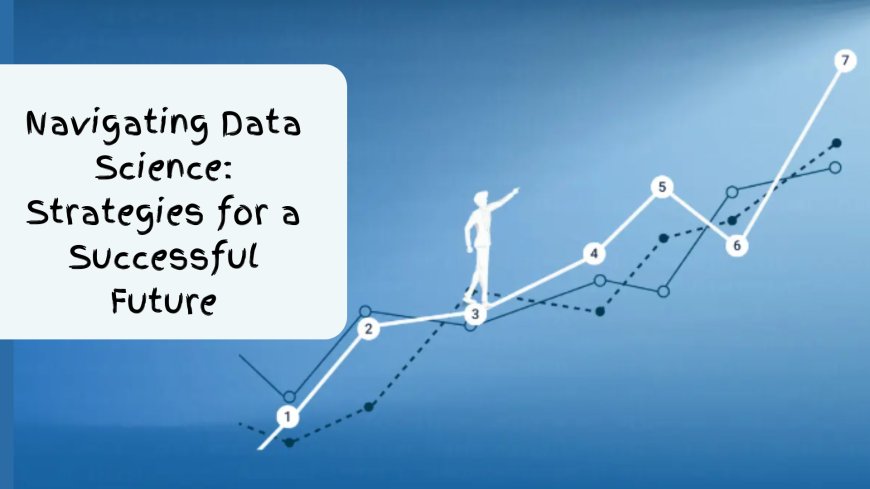Navigating Data Science: Strategies for a Successful Future
Today, data science is one of the most popular fields because we rely so much on data. From predicting consumer behavior to optimizing business processes, data science offers immense potential for transforming industries. However, navigating the vast landscape of data science can be challenging, especially for newcomers. This article provides a comprehensive guide on strategies for a successful future in data science, focusing on key skills, essential tools, industry trends, and practical tips.

Today, data science is one of the most popular fields because we rely so much on data. From predicting consumer behavior to optimizing business processes, data science offers immense potential for transforming industries. However, navigating the vast landscape of data science can be challenging, especially for newcomers. This article provides a comprehensive guide on strategies for a successful future in data science, focusing on key skills, essential tools, industry trends, and practical tips.
Understanding the Basics
What is Data Science?
Data science is a field that combines different methods and techniques to analyze and understand data, whether it's organized or not, to gain useful information and insights. It involves a blend of statistics, computer science, and domain expertise to analyze and interpret complex data sets.
Why is Data Science Important?
Data science plays a crucial role in decision-making across various sectors. It helps organizations understand patterns and trends, forecast future outcomes, and make data-driven decisions. For example, in healthcare, data science can predict disease outbreaks and improve patient care. In finance, it can find fake transactions and help control risks.
Key Skills for Data Scientists
To succeed in data science, one needs a diverse set of skills. Here are some key skills every aspiring data scientist should focus on:
1. Programming Skills
Being skilled in programming languages like Python and R is very important. Python, in particular, is favored for its simplicity and a wide range of libraries such as Pandas, NumPy, and Scikit-Learn that are useful for data manipulation and machine learning.
2. Statistical Knowledge
A solid understanding of statistics is fundamental. This includes knowledge of probability, hypothesis testing, regression analysis, and statistical inference. These concepts are vital for designing experiments and making sense of data.
3. Machine Learning
Machine learning is at the heart of data science. Familiarize yourself with algorithms such as linear regression, decision trees, random forests, and neural networks. Understanding when and how to apply these algorithms is essential.
4. Data Wrangling
Data often comes in messy, unstructured formats. Data wrangling involves cleaning, transforming, and organizing raw data into a useful format. Tools like SQL, Excel, and Python libraries (e.g., Pandas) are indispensable for this task.
5. Data Visualization
Being able to visualize data is crucial for communicating insights effectively. Tools like Tableau, Power BI, and Matplotlib help in creating meaningful visualizations that tell a compelling story.
Essential Tools and Technologies
The data science toolkit is vast and continually evolving. Here are some essential tools and technologies every data scientist should be familiar with:
1. Programming Languages
-
Python: Widely used for its versatility and extensive libraries.
-
R: Known for its statistical computing capabilities.
2. Data Manipulation Tools
-
Pandas: A Python library for data manipulation and analysis.
-
SQL: Essential for querying databases and handling structured data.
3. Machine Learning Frameworks
-
Scikit-Learn: A Python library that provides easy-to-use tools for data mining and data analysis.
-
TensorFlow and Keras: Used for building and training deep learning models.
4. Data Visualization Tools
-
Tableau: A strong tool for making interactive and shareable data visualizations and dashboards.
-
Matplotlib and Seaborn: Python libraries for making pictures that stay still, move around, or let you do things with them.
5. Big Data Technologies
-
Hadoop: An open-source system for storing and handling large amounts of data across multiple locations.
-
Spark: A free software that handles big data processing tasks in one place.
Staying Updated with Industry Trends
The field of data science is always changing, with new technologies and methods coming out often. Staying current with these trends is important to stay competitive. Here are some ways to keep up with what's happening in the industry:
1. Continuous Learning
Enroll in online courses and attend workshops. Platforms like Coursera, edX, and Udacity offer a wide range of courses in data science and related fields. Participating in webinars and industry conferences can also provide valuable insights.
2. Reading and Research
Follow industry blogs, journals, and publications. Websites like Towards Data Science, KDnuggets, and Analytics Vidhya publish articles on the latest trends and advancements in data science.
3. Networking
Join professional networks and communities. Platforms like LinkedIn, GitHub, and Reddit have active data science communities where professionals share knowledge, collaborate on projects, and discuss industry trends.
Practical Tips for Aspiring Data Scientists
Embarking on a career in data science can be daunting, but these practical tips can help you navigate the journey successfully:
1. Build a Strong Foundation
Focus on mastering the basics before diving into advanced topics. A solid understanding of statistics, programming, and machine learning will serve as a strong foundation for your career.
2. Work on Real Projects
Get involved in practical projects, join hackathons, and contribute to open-source initiatives. Creating a portfolio of projects demonstrates your abilities to potential employers.
3. Seek Mentorship
Having a mentor can accelerate your learning process. Seek guidance from experienced professionals in the field who can provide valuable advice and insights.
4. Practice Problem-Solving
Data science is about solving problems. Practice by working on different types of data sets and challenges. Websites like Kaggle offer a variety of competitions and datasets to hone your skills.
5. Develop Communication Skills
It's important to be able to clearly share what you discover. Work on your presentation and storytelling skills to ensure your insights are understood by non-technical stakeholders.
Future Outlook
The future of data science looks promising. With the growing importance of data in decision-making, the demand for skilled data scientists is expected to rise. Emerging technologies such as artificial intelligence, machine learning, and big data analytics will continue to drive the field forward. Access to Data Science Training in Delhi & all other cities in India ensures that more individuals can acquire the necessary skills to thrive in this evolving landscape.
Embracing AI and Machine Learning
Artificial intelligence (AI) and machine learning (ML) are transforming industries. Understanding these technologies and their applications will be critical for future data scientists. Focus on learning how to build and deploy AI and ML models effectively.
Ethical Considerations
As data science evolves, ethical considerations around data privacy and security are becoming increasingly important. Future data scientists must be aware of ethical guidelines and best practices to ensure responsible use of data.
Conclusion
Navigating the world of data science requires a blend of technical skills, continuous learning, and practical experience. By mastering the essential skills, staying updated with industry trends, and applying practical strategies, aspiring data scientists can position themselves for a successful future. The journey may be challenging, but with dedication and perseverance, the rewards are well worth the effort. Embrace the opportunities that data science offers, and you will be well on your way to making a significant impact in this exciting field.
What's Your Reaction?
 Like
0
Like
0
 Dislike
0
Dislike
0
 Love
0
Love
0
 Funny
0
Funny
0
 Angry
0
Angry
0
 Sad
0
Sad
0
 Wow
0
Wow
0



















































